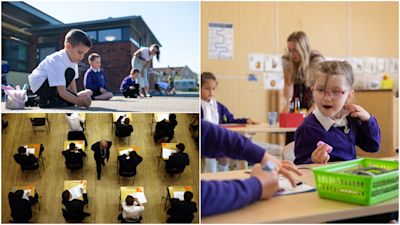How will schools return safely in September?

All pupils should be back in school in England by September under new government guidelines announced on Thursday by the education secretary.
From the beginning of the autumn term, limits on attendance will be lifted to allow schools to open at full capacity, and schools and colleges are being asked to return to a full curriculum ahead of exams next summer.
But, after several false starts, how will schools open safely to all pupils after the summer break?
These are the six main steps, according to the latest government blue print set out by Gavin Williamson on Thursday.
Bigger bubbles
Schools in England have been told to keep children in class or year-sized “bubbles” and avoid creating “busy corridors” when all pupils return in September.
Previously the advice had been to create groups no bigger than 15, but this would be largely unworkable once all pupils return.
Staff and pupils are being asked to to keep their distance from each other and avoid touching.
Other measures set out in the guidance include:
teachers to distance from each other and older students where possible
increasing the frequency of cleaning
reducing the use of frequently shared items
minimising contact in corridors
Ban on big groups
Older pupils should be encouraged to be kept away from other groups of students and staff, the advice states.
Schools have been told to avoid large gatherings, such as assemblies, and to avoid singing in larger groups, such as school choirs and ensembles.
Teachers have also been advised to stagger break times, start and finish times, and to consider using “walking buses” to reduce the use of public transport.
Mr Williamson said school buses could be segregated to ensure pupils remained in their “bubbles”.
Despite the guidance aimed at preventing children from different year groups mixing, Mr Williamson said he wanted breakfast and after-school clubs alongside the full opening of schools in September, acknowledging how "vital" these are to parents and guardians.
A headteachers’ union has warned that it will be “enormously challenging” for schools to keep children apart in year-group-sized “bubbles” in September.
Geoff Barton, general secretary of the Association of School and College Leaders (ASCL), said: “The logistics of keeping apart many different ‘bubbles’ of children in a full school, including whole year groups comprising hundreds of pupils, is mind-boggling.
“School leaders will have to consider implementing staggered starts, finishes and lunchtimes, alongside transport to and from school, on an epic scale.”
Groups sizes unlimited in early learning settings
Limits on group sizes will be lifted in nurseries, childminders and early years providers in England from July 20 so more children can attend in the summer holidays.
Better testing
The Government will provide all schools and colleges with a small number of home testing kits by the start of the autumn term.
The whole school, or all pupils in a year group, may have to self-isolate at home if schools have two or more confirmed coronavirus cases within a fortnight.
But the guidance insists school closures “may not be necessary” if there are a number of confirmed cases of Covid-19 on site if schools implement the recommended controls.
The official guidance says mobile units can be dispatched to schools to test anyone who has been in contact with the child, or member of staff, who has tested positive.
Testing will first focus on the person’s class, followed by their year group, then the whole school if necessary.
Schools will be expected to have plans in place to offer remote education to pupils who are self-isolating, the government said.
The education secretary said there were still 10,000 outstanding orders for equipment aimed at helping children learn at home, including laptops and also internet routers, but said some authorities had not put in requests for their pupils.
Mandatory attendance
Addressing the House of Commons, Mr Williamson said returning to normal educational routines was “critical” to the national recovery, as he reiterated that attendance in schools and colleges will be mandatory from September.
Labour's shadow education secretary Kate Green argued fining poorer parents would "not serve the best interests of their children".
“Parents need reassurance that their children will be safe, especially in communities – including ethnic minority communities – where the prevalence of Covid is higher,” she said during Mr Williamson's Commons statement.
Gaps in the curriculum to be plugged
Students starting secondary school in Year 7 in the autumn may need to be taught essential knowledge and skills from the primary school curriculum to address gaps in English and maths.
On Thursday, exams regulator Ofqual announced plans to delay the start of next year’s GCSE exams to allow more time for teaching amid the disruption.
Schools should consider how to fill the gaps in students' "core knowledge".
The Government’s £1 billion Covid catch-up package was announced to help children fill any educational gaps.
Williamson said £350million of that budget had been "ring-fenced" to provide tutoring for disadvantaged children who may have fallen behind.
Exams will take place in 2021 and measures will be taken to mitigate any impact on pupils after what will equate to six months missed schooling.
Ofsted will carry out visits to schools in the autumn term to discuss how they are supporting the return to education for their pupils.
Routine inspections planned to restart in January 2021.